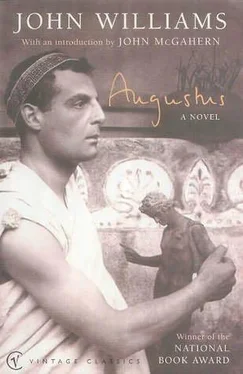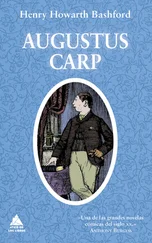John Williams - Augustus
Здесь есть возможность читать онлайн «John Williams - Augustus» весь текст электронной книги совершенно бесплатно (целиком полную версию без сокращений). В некоторых случаях можно слушать аудио, скачать через торрент в формате fb2 и присутствует краткое содержание. Жанр: Историческая проза, на английском языке. Описание произведения, (предисловие) а так же отзывы посетителей доступны на портале библиотеки ЛибКат.
- Название:Augustus
- Автор:
- Жанр:
- Год:неизвестен
- ISBN:нет данных
- Рейтинг книги:3 / 5. Голосов: 1
-
Избранное:Добавить в избранное
- Отзывы:
-
Ваша оценка:
- 60
- 1
- 2
- 3
- 4
- 5
Augustus: краткое содержание, описание и аннотация
Предлагаем к чтению аннотацию, описание, краткое содержание или предисловие (зависит от того, что написал сам автор книги «Augustus»). Если вы не нашли необходимую информацию о книге — напишите в комментариях, мы постараемся отыскать её.
Augustus — читать онлайн бесплатно полную книгу (весь текст) целиком
Ниже представлен текст книги, разбитый по страницам. Система сохранения места последней прочитанной страницы, позволяет с удобством читать онлайн бесплатно книгу «Augustus», без необходимости каждый раз заново искать на чём Вы остановились. Поставьте закладку, и сможете в любой момент перейти на страницу, на которой закончили чтение.
Интервал:
Закладка:
Will you return to me this autumn, before the winter storms make your voyage impossible? Or will you wait until spring? It seems to me that I shall not be able to endure your absence for so long. You must tell me how I may endure.
VII Letter: Quintus Horatius Flaccus to Gains Cilnius Maecenas, at Arezzo (19 B.C.)
Our Vergil is dead.
I have just received the news, and I write you of it before grief overwhelms the numbness that I feel now, a numbness that must be a foretaste of that inexorable fate that has overtaken our friend, and which pursues us all. His remains are in Brindisi, attended by Octavius. The details are sketchy; I shall pass on to you what I have learned, for I have no doubt that Octavius's grief will delay his writing to you for some time.
Apparently the work of revision upon his poem, for the sake of which he had absented himself from Italy, had been going badly. Thus when Octavius, returning to Rome from Asia, stopped off at Athens, he had little difficulty persuading Vergil to accompany him back to Italy, for which he was already homesick, though he had been away for less than six months. Or perhaps he had some intimation of his death, and did not want his body to waste in a foreign soil. In any event, before setting out on the final journey, he persuaded Octavius to visit Megara with him; perhaps he wished to see that valley of rocks where the young Theseus is said to have slain the murderer Sciron. Whatever the reason, Vergil remained too long in the sun, and became ill. However, he insisted upon continuing the voyage; aboard ship, his condition worsened, and an old malaria returned upon him. Three days after landing at Brindisi, he died. Octavius was at his bedside, and accompanied him as far as any can on that journey from which there is no return.
I understand that he was delirious much of the time during his last days-though I have no doubt that Vergil delirious was more reasonable than most men lucid. At the end he spoke your name, and mine, and that of Varius. And he elicited from Octavius the promise that the unperfected manuscript of his Aeneid be destroyed. I trust that the promise will not be kept.
I wrote once that Vergil was half my soul. I feel now that I understated what I thought then was an exaggeration. For at Brindisi lies half the soul of Rome; we are diminished more than we know. -And yet my mind returns to smaller things, to things that only you and I, perhaps, can ever understand. At Brindisi, he lies. When was it that the three of us traveled so happily across Italy, from Rome to Brindisi? Twenty years… It seems yesterday. I can still feel my eyes smart from the smoke of the green wood that the innkeepers burned in their fireplaces, and hear our laughter like that of boys released from school. And the farm girl we picked up at Trivicus, who promised to come to my room, and did not; I hear Vergil mocking me, and remember the horseplay. And the quiet talk. And the luxuriant comfort of Brindisi, after the countryside.
I shall not return to Brindisi again. Grief comes upon me now, and I cannot write more.
VIII. The Journal of Julia, Pandateria (A.D. 4)
In my youth, when I first knew her, I thought Terentia to be a trivial, foolish, and amusing woman, and I could not understand my father's fondness for her. She chattered like a magpie, flirted outrageously with everyone, and it seemed to me that her mind had never been violated by a serious thought. Though he was my father's friend, I did not like her husband, Gaius Maecenas; and I was never able to understand Terentia's agreement to that union with him. Looking back upon it, I can see that my marriage to Marcus Agrippa was nearly as strange; but then I was young and ignorant, and so filled with myself that I could see nothing.
I have come to understand Terentia, I believe. In her own way, she may have been wiser than any of us. I do not know what has become of her. What does become of people who slip quietly out of your life?
I believe now that she loved my father, perhaps in a way that even he did not understand. Or perhaps he did. She was reasonably faithful to him, taking casual lovers only during his protracted absences. And perhaps, too, his fondness for her was more serious than his appearance of amused toleration led me then to believe. They were together for more than ten years, and seemed happy to be so. I see now-perhaps I dimly saw even then-that my judgments were those of youth and position. My husband, who could have been my father, was the most important man in Rome and its provinces during my father's absence; and I imagined myself to be another Livia, as proud and grave as she, at the side of one who might as well have been the true Emperor. Thus it did not seem appropriate to me that my father should love one so unlike Livia (and, as I foolishly thought, myself) as Terentia. But I remember things now that I did not recognize then.
I remember when my father returned alone from Asia, having only a few days before, at Brindisi, held in his arms his dying friend Vergil, and watched the breath go out of his body. Terentia was the only one who gave him comfort. Livia did not; I did not. I knew the idea of loss, but not its self. Livia spoke to him the ritual words that were meant to be comfort: Vergil had done his duty to his country, he would live in the memories of his countrymen, and the gods would receive him as one of their favored sons. And she hinted that too much grief was unseemly from the person of the Emperor.
My father looked at her gravely, and said: "Then the Emperor will show that grief that befits an Emperor. But how shall the man show the grief that befits him?"
It was Terentia who gave him comfort. She wept at the loss of their friend, recalled old memories, until my father became the man and wept too, at last had to comfort Terentia, and thus was comforted himself.
… I do not know why I thought of Terentia today, or of the death of Vergil. The morning is bright; the sky is clear; and far beyond my window, to the east, I see that point of land that juts into the sea above Naples. Perhaps I remembered that Vergil lived there when he was not in Rome, and remembered that he had been fond of Terentia in that dour way of his that concealed so much sentiment. And Terentia is a woman, even as I once was.
Even as I once was… Was Terentia content to be a woman, as I was not? When I lived in the world, I believed that she was content, and had a secret contempt for her. Now I do not know. I do not know the human heart of another; I do not even know my own.
IX. Letter: Nicolaus of Damascus to Strabo of Amasia (18 B. c.)
Herod is in Rome. He is well pleased with my life of Octavius Caesar, which has been published abroad, and wishes me to remain here in the city for an indefinite period, so that he might have a trustworthy liaison with the Emperor. It is rather a delicate position, as you might imagine; but I feel confident that I can acquit my duties. Herod knows that I have the confidence and friendship of the Emperor, and I believe he has the wisdom to understand that I will betray neither; he is practical enough, at least, to know that if I do so, I should be of no further use to either of them.
Despite your kind praise, I have at last come to the conclusion that I would be wise to abandon the projected work that was to be called "Conversations with Notable Romans." As I have come to know these people, I have been forced to acknowledge that the Aristotelian mode in which we have both been schooled simply is not one in whose terms they may be defined. It is a difficult decision for me to make, for it must signify one of two things: either those modes in which we were schooled are incomplete, or I am not so finished a scholar of the master as I had led myself to believe. The former is too nearly inconceivable and the latter too humiliating to contemplate; and I would make this admission to none save you, who are the friend of my youth.
Читать дальшеИнтервал:
Закладка:
Похожие книги на «Augustus»
Представляем Вашему вниманию похожие книги на «Augustus» списком для выбора. Мы отобрали схожую по названию и смыслу литературу в надежде предоставить читателям больше вариантов отыскать новые, интересные, ещё непрочитанные произведения.
Обсуждение, отзывы о книге «Augustus» и просто собственные мнения читателей. Оставьте ваши комментарии, напишите, что Вы думаете о произведении, его смысле или главных героях. Укажите что конкретно понравилось, а что нет, и почему Вы так считаете.











